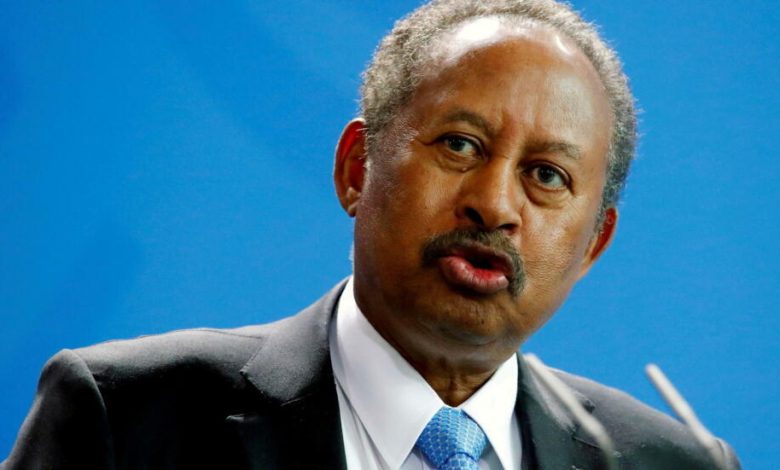Sudan Squanders Hamdok Government’s Gains… U.S. Ban Reinforces Terrorism Stigma

Sudan’s efforts to have its name removed from the U.S. list of state sponsors of terrorism — a goal achieved five years ago — were undone by a recent decision placing the country on a new U.S. travel ban list.
-
Hamdok pledges victory and vows to hold violators accountable
-
Al-Burhan Targets Hamdok with Death Penalty to Foil Ceasefire Efforts
Last week, U.S. President Donald Trump issued an order banning citizens from 12 countries — including Sudan — from entering the United States, citing a “widespread presence of terrorists” and “inadequate identity verification” for travelers.
The order, which took effect this past Monday, fully suspends the entry of Sudanese nationals, both immigrants and non-immigrants, into the U.S.
-
Sudan: Prime Minister Abdalla Hamdok Blocks Humanitarian Aid to Darfur via Chad
-
Hamdok insists on the “Addis Ababa track,” while the “exchange of shelling” ignites Khartoum
Wave of Outrage
The decision sparked widespread outrage among Sudanese people, who condemned what they perceive as a lack of genuine efforts to stop the war — especially from the Sudanese army, which, according to observers, not only avoided peace negotiations but further plunged the country into chaos through alliances with extremist Islamist militias.
Sudanese activists took to social media, describing the U.S. decision as a “fall” back into the dark tunnel of terrorism suspicion — a label Sudan had successfully shaken off under former Prime Minister Abdalla Hamdok following the 2019 revolution.
-
The dissolved government of Hamdok continues to engage with the United Nations regarding al-Burhan’s participation
-
Hamdok in a press conference: Suffering has worsened due to ongoing conflicts
Many expressed regret over the country’s current state under military leadership, holding the 2021 coup by General Abdel Fattah al-Burhan against Hamdok’s civilian government responsible for Sudan’s renewed international isolation.
The Cost of Chaos
Sudanese journalist and political analyst Mohamed Abdelbagi said that the U.S. administration was compelled to add Sudan to the banned list due to the ongoing “security chaos” brought on by the war.
-
Hamdok: Third possible return to resolve Sudan crisis
-
Sudan Prime Minister Hamdok intends to resign soon
He explained that the conflict has directly undermined services provided by immigration and passport agencies, making identity verification unreliable due to the state’s collapse and military preoccupation.
He also highlighted a severe breakdown in official databases caused by damage to government buildings, communication networks, and electricity infrastructure amid ongoing fighting.
Abdelbagi pointed to the rise of extremist groups affiliated with the Muslim Brotherhood, ISIS, and other terrorist networks — developments that have alarmed the U.S. and prompted stricter entry restrictions.
-
Feltman renews his call to al-Burhan for the return of Hamdok’s government
-
Timeline Sudan’s remove el Bechir to topple Hamdok
He acknowledged that the previous U.S. decision to delist Sudan was based on signs of institutional recovery following the 2019 revolution, which ousted the Brotherhood-led regime. But the current war — with active Islamist involvement — has re-ignited security concerns for countries intolerant of any terrorism risks.
The ban applies to Sudan, Afghanistan, Myanmar, Chad, Congo, Equatorial Guinea, Eritrea, Haiti, Iran, Libya, Somalia, and Yemen. Partial restrictions were also placed on travelers from Burundi, Cuba, Laos, Sierra Leone, Togo, Turkmenistan, and Venezuela.
-
Arrests in Sudan… Hamdok is “clinging” to the position
-
Hamdok Stresses got to Reach Binding Agreement on GERD
SABA Responds
President Trump’s decision dealt a harsh blow to Sudanese citizens already facing a dire future, as war tears their country apart and many struggle to reach safety and stability.
Since April 2023, fighting between the Sudanese army and the Rapid Support Forces has left tens of thousands dead and over 13 million people displaced, creating what is now “the world’s largest humanitarian crisis.”
The Sudanese American Medical Association (SABA) expressed concern about how the travel ban could impact Sudanese medical professionals.
-
Muslim Brotherhood Security Cells: International Documentation Exposes a Plot to Silence War Opponents in Sudan
-
AFP: Sudan’s Rapid Support Forces and Allies Sign Charter to Form a Rival Government
SABA noted that 80 Sudanese medical graduates had been accepted into U.S. residency and fellowship programs starting July 1, 2025, but may now be barred from entering the country.
It also warned that Sudanese doctors currently in the U.S. on J-1 visas might be unable to visit family abroad or reunite with loved ones.
SABA said it is working with legal and immigration partners to explore possible solutions and pledged to keep affected members informed with timely updates.












